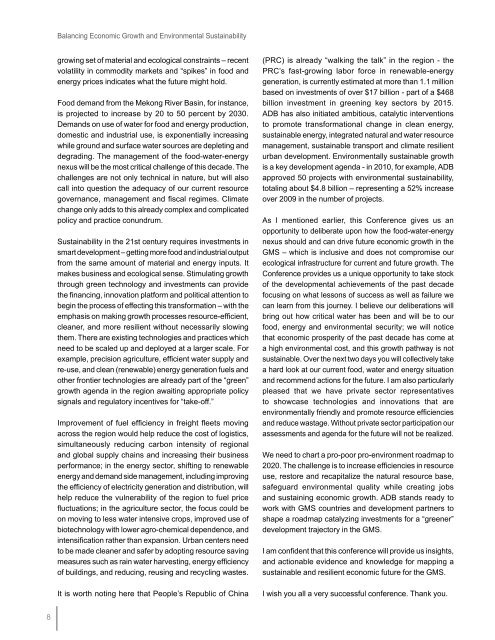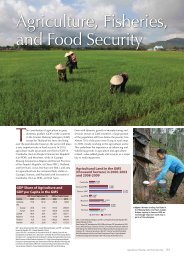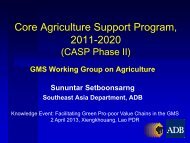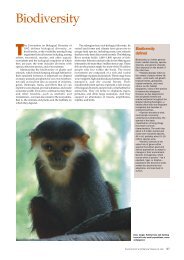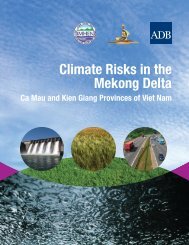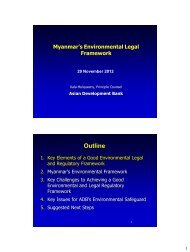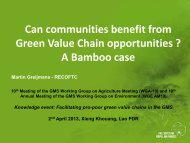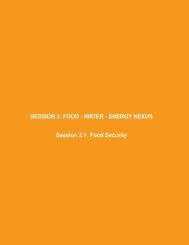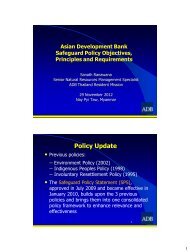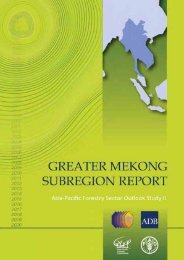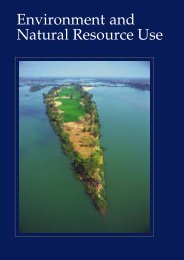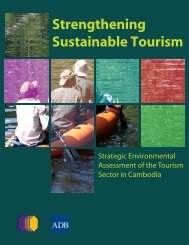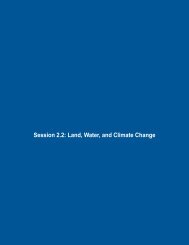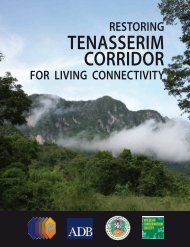Foreword and Conference Inauguration - GMS-EOC
Foreword and Conference Inauguration - GMS-EOC
Foreword and Conference Inauguration - GMS-EOC
Create successful ePaper yourself
Turn your PDF publications into a flip-book with our unique Google optimized e-Paper software.
8<br />
Balancing Economic Growth <strong>and</strong> Environmental Sustainability<br />
growing set of material <strong>and</strong> ecological constraints – recent<br />
volatility in commodity markets <strong>and</strong> “spikes” in food <strong>and</strong><br />
energy prices indicates what the future might hold.<br />
Food dem<strong>and</strong> from the Mekong River Basin, for instance,<br />
is projected to increase by 20 to 50 percent by 2030.<br />
Dem<strong>and</strong>s on use of water for food <strong>and</strong> energy production,<br />
domestic <strong>and</strong> industrial use, is exponentially increasing<br />
while ground <strong>and</strong> surface water sources are depleting <strong>and</strong><br />
degrading. The management of the food-water-energy<br />
nexus will be the most critical challenge of this decade. The<br />
challenges are not only technical in nature, but will also<br />
call into question the adequacy of our current resource<br />
governance, management <strong>and</strong> fiscal regimes. Climate<br />
change only adds to this already complex <strong>and</strong> complicated<br />
policy <strong>and</strong> practice conundrum.<br />
Sustainability in the 21st century requires investments in<br />
smart development – getting more food <strong>and</strong> industrial output<br />
from the same amount of material <strong>and</strong> energy inputs. It<br />
makes business <strong>and</strong> ecological sense. Stimulating growth<br />
through green technology <strong>and</strong> investments can provide<br />
the financing, innovation platform <strong>and</strong> political attention to<br />
begin the process of effecting this transformation – with the<br />
emphasis on making growth processes resource-efficient,<br />
cleaner, <strong>and</strong> more resilient without necessarily slowing<br />
them. There are existing technologies <strong>and</strong> practices which<br />
need to be scaled up <strong>and</strong> deployed at a larger scale. For<br />
example, precision agriculture, efficient water supply <strong>and</strong><br />
re-use, <strong>and</strong> clean (renewable) energy generation fuels <strong>and</strong><br />
other frontier technologies are already part of the “green”<br />
growth agenda in the region awaiting appropriate policy<br />
signals <strong>and</strong> regulatory incentives for “take-off.”<br />
Improvement of fuel efficiency in freight fleets moving<br />
across the region would help reduce the cost of logistics,<br />
simultaneously reducing carbon intensity of regional<br />
<strong>and</strong> global supply chains <strong>and</strong> increasing their business<br />
performance; in the energy sector, shifting to renewable<br />
energy <strong>and</strong> dem<strong>and</strong> side management, including improving<br />
the efficiency of electricity generation <strong>and</strong> distribution, will<br />
help reduce the vulnerability of the region to fuel price<br />
fluctuations; in the agriculture sector, the focus could be<br />
on moving to less water intensive crops, improved use of<br />
biotechnology with lower agro-chemical dependence, <strong>and</strong><br />
intensification rather than expansion. Urban centers need<br />
to be made cleaner <strong>and</strong> safer by adopting resource saving<br />
measures such as rain water harvesting, energy efficiency<br />
of buildings, <strong>and</strong> reducing, reusing <strong>and</strong> recycling wastes.<br />
It is worth noting here that People’s Republic of China<br />
(PRC) is already “walking the talk” in the region - the<br />
PRC’s fast-growing labor force in renewable-energy<br />
generation, is currently estimated at more than 1.1 million<br />
based on investments of over $17 billion - part of a $468<br />
billion investment in greening key sectors by 2015.<br />
ADB has also initiated ambitious, catalytic interventions<br />
to promote transformational change in clean energy,<br />
sustainable energy, integrated natural <strong>and</strong> water resource<br />
management, sustainable transport <strong>and</strong> climate resilient<br />
urban development. Environmentally sustainable growth<br />
is a key development agenda - in 2010, for example, ADB<br />
approved 50 projects with environmental sustainability,<br />
totaling about $4.8 billion – representing a 52% increase<br />
over 2009 in the number of projects.<br />
As I mentioned earlier, this <strong>Conference</strong> gives us an<br />
opportunity to deliberate upon how the food-water-energy<br />
nexus should <strong>and</strong> can drive future economic growth in the<br />
<strong>GMS</strong> – which is inclusive <strong>and</strong> does not compromise our<br />
ecological infrastructure for current <strong>and</strong> future growth. The<br />
<strong>Conference</strong> provides us a unique opportunity to take stock<br />
of the developmental achievements of the past decade<br />
focusing on what lessons of success as well as failure we<br />
can learn from this journey. I believe our deliberations will<br />
bring out how critical water has been <strong>and</strong> will be to our<br />
food, energy <strong>and</strong> environmental security; we will notice<br />
that economic prosperity of the past decade has come at<br />
a high environmental cost, <strong>and</strong> this growth pathway is not<br />
sustainable. Over the next two days you will collectively take<br />
a hard look at our current food, water <strong>and</strong> energy situation<br />
<strong>and</strong> recommend actions for the future. I am also particularly<br />
pleased that we have private sector representatives<br />
to showcase technologies <strong>and</strong> innovations that are<br />
environmentally friendly <strong>and</strong> promote resource efficiencies<br />
<strong>and</strong> reduce wastage. Without private sector participation our<br />
assessments <strong>and</strong> agenda for the future will not be realized.<br />
We need to chart a pro-poor pro-environment roadmap to<br />
2020. The challenge is to increase efficiencies in resource<br />
use, restore <strong>and</strong> recapitalize the natural resource base,<br />
safeguard environmental quality while creating jobs<br />
<strong>and</strong> sustaining economic growth. ADB st<strong>and</strong>s ready to<br />
work with <strong>GMS</strong> countries <strong>and</strong> development partners to<br />
shape a roadmap catalyzing investments for a “greener”<br />
development trajectory in the <strong>GMS</strong>.<br />
I am confident that this conference will provide us insights,<br />
<strong>and</strong> actionable evidence <strong>and</strong> knowledge for mapping a<br />
sustainable <strong>and</strong> resilient economic future for the <strong>GMS</strong>.<br />
I wish you all a very successful conference. Thank you.


